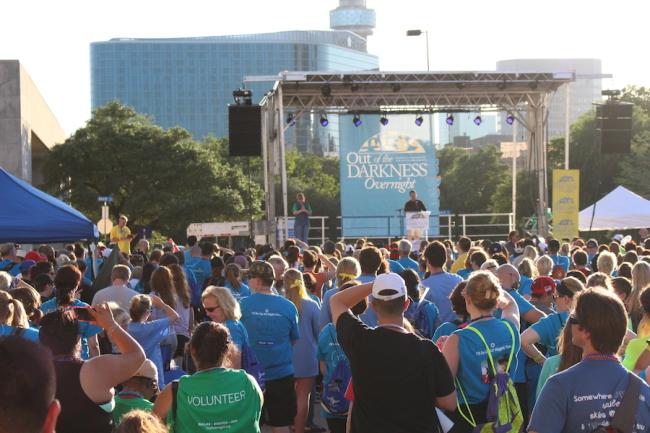With water bottles, backpacks and snacks in hand, more than 1,300 walkers made their way throughout downtown Dallas this weekend, walking 16 miles to raise money and awareness for the fight against suicide.
The participants joined together at 7 p.m. at the Dallas City Hall to walk from dusk to dawn in the American Foundation for Suicide Prevention (AFSP) Out of the Darkness Overnight Walk, the first one ever in Dallas.
Each walker was required to raise a minimum of $1,000, or $700 for students, to participate in the event. The funds go toward research, educational programs, advocates for public policy, and to those affected.
One SMU team consisting of seniors Kali Ruppert and Camille Waterfallen participated in the event. Waterfallen said she heard of the event through Ruppert and chose to walk because she has friends who have suffered from mental illness, in addition to losing a family member to suicide.
“I wanted to walk for them: to honor those who have been lost and to support those who are still suffering,” Waterfallen said.
The Out of the Darkness Walks began in Washington, D.C. in 2002 by someone who lost a loved one due to suicide. According to the AFSP website, the event is named Out of the Darkness to represent people literally and figuratively walking out of the darkness about suicide to discuss its impact and increase its awareness. Since its creation, more than $30 million has been raised for the cause.
Almost every individual present was touched by suicide or mental illness in some way. Some were walking in memory of those they lost to suicide, others honoring those who have struggled with mental illness. Names of family members and friends and photos of lost loved ones were present on walkers’ backpacks, shirts and posters throughout the walk.
Walkers also wore different colored beads symbolizing the loss of a sibling, military or first responder, partner or a spouse, parent, child, and friend or relative. Other beads represented support of the cause and those who have had a personal struggle.
Walker Lisa Shahul was honoring her father, who took his life in March 1995. Shahul explained how the tragic death of her father’s twin brother was at the core of his depression. It was his inability to heal, Shahul said, that magnified the other obstacles her father faced later in life. After many years, Shahul said she gained a new appreciation for how complex the healing process can be.
“I understand and forgive him, and have found peace,” she said. “I have made a personal vow that I will be open with my life with my dad and my life without him.”
Walks like the AFSP Overnight help people like Shahul deal with their pain instead of avoiding it and feeling nothing.
“The truth is my story is just one of thousands here this evening,” she said. “We are walking not to be silent but to be heard.”
Walking 16 miles is no easy feat, especially during the middle of the night. At mile 4, the thirst sets in; at mile 8, leg muscles start to grow sore; at mile 10, the body grows tired until mile 15, when one finds the last push of strength to make it to the end.
“During the most difficult parts of the walk, Kali and I just kept talking about how we had to finish. We had already walked so far and had to finish what we had started,” Waterfallen said.
Cheering stations and rest stations along the way encouraged walkers to keep going as they received high fives, drinks, snacks and support. SMU’s Dallas Hall Lawn acted as a Midnight Snack Break where walkers ate a midnight meal, received medical attention and rested their legs.
Robert Gebbia, CEO of AFSP, thanked those present for raising awareness and helping AFSP become the largest private funder of suicide research in the country. According to Gebbia, in the past five years AFSP has awarded grants to over one hundred studies to educate students, teachers, clinicians and people about suicide and mental illness. AFSP also passed legislation in several states, including Texas, which requires all teachers to be trained in suicide prevention.
“What we have is a movement. A movement that was unimaginable a decade ago […] a movement that will save lives,” Gebbia said.
The experience taught walkers, like Waterfallen, a lot about themselves and their communities.
“I learned that walking for 16 miles straight is actually very difficult and painful,” Waterfallen said. “And that there is an amazing community for those with mental illness and those who have lost loved ones to suicide,” Waterfallen said.












